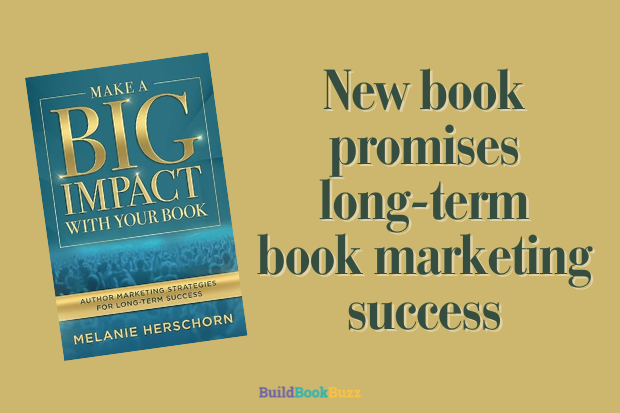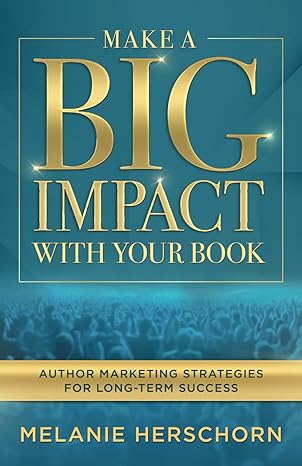New book promises long-term book marketing success
Can reading a single book help you achieve long-term book marketing success? My review of the book making that promise will help you decide.
Affiliate Disclosure: This post contains Amazon Associates links, which means if you click on them and make a purchase, I will receive a couple of pennies (at no extra charge to you).
I learned about Make a Big Impact With Your Book: Author Marketing Strategies for Long-Term Success by book marketer Melanie Herschorn on social media.
Without looking the book up on Amazon, I contacted the author for a review copy. The title told me that it’s a book you’ll want to know about. (I mean, if you’re reading a book marketing blog, you’re probably interested in long-term book marketing success.)
I didn’t even look at the Amazon description before I started reading the book. Again, the title was so broadly on-target with what most of my blog readers want to learn, that I didn’t think I needed to.
That was a mistake.
Note to self: Always read the book’s description
It’s why I was surprised when I saw in the third paragraph of the first page of text that the book is for “thought leaders” who have written a nonfiction book. That’s a pretty narrow focus.
Huh.
Only then did I pull the book up on Amazon.
The description clearly says,“Are you a nonfiction or children’s book author with a powerful message to share with the world? Do you dream of becoming a thought leader, increasing your book sales, and leaving a lasting impact on your readers?”
Whoops.
Stop now if you write fiction
The fact that it’s for a narrower audience than I expected is not a dealbreaker, of course. (But it does explain why my Kindle announced it was a one-hour read and the description noted the paperback version is just 115 pages.)
And really, so much of what works with nonfiction book marketing also applies to fiction.
Except not in this case – and that’s okay. Most of Make a Big Impact With Your Book won’t help novelists.
The key to long-term book marketing success
This book is built around the premise that its readers are mission-driven (yes, cynical me rolled her eyes while reading that chapter), and the advice focuses 100% on content marketing.
The Content Marketing Institute defines content marketing as “a strategic marketing approach focused on creating and distributing valuable, relevant, and consistent content to attract and retain a clearly defined audience — and, ultimately, to drive profitable customer action.”
It adds that when you use content marketing, you aren’t pitching products or services – in this case, a book. Instead, you’re providing your target audience with relevant information that helps them in some way.
It’s an approach designed to build trust in the entity providing the useful content.
All good. This blog is an example of content marketing, so you know I appreciate the strategy’s value.
Repurpose your book’s content for long-term book marketing success
The author wisely advises readers to build their content marketing plan from their book’s content. She explains that you can use it to create:
- Blog posts
- White papers
- Podcasts
- Emails
- Social media posts
- Lead magnets
- Guest blog posts
- Articles for blogging platforms such as Medium and Substack
- Public speaking
- LinkedIn articles and newsletters
- Recorded videos
- Live videos
- Online summit presentations
(I’ll add one more to her list: tip sheets.)
This strategy is absolutely a smart timesaver.
Herschorn shares more “what” and “why” than “how,” though. She writes about what you need to do, but I felt like you’d need more instruction on how to do much of it.
Still, repurposing your book’s content into several different forms for marketing purposes is smart.
Repurposing your book’s content into several different forms for marketing purposes is smart.Click to tweetWill the book help children’s book authors?
Back to that book description I overlooked…it says it’s for children’s book authors.
Um, no.
The content marketing strategy might work for some children’s book authors, especially nonfiction books for older readers.
But there’s no question that it’s a book for people who have written nonfiction books they want to use as giant business cards to generate consulting and speaking gigs, among other opportunities.
The author illustrates her points with helpful anecdotes from client experiences, but only one of them is for a children’s book.
Children’s book authors might need more help connecting the dots than the book offers.
Should you buy this book?
Take these specifics into account before buying this book:
- I’ll admit that I feel like the title makes it a bit of a bait and switch. A more accurate title would be: Make a Big Impact with Your Nonfiction Book: Content Marketing Strategies for Long-Term Success.
- The author’s advice is solid. And some of it is universal for all authors — specifically, why you must get clear on your target audience and where you’ll find them online, and the importance of consistency in your marketing.
- Readers get a URL for several helpful worksheets and tips. That URL is repeated over and over and over. Including screenshots for those bonus resources plus information on how to use the worksheets would have added value to the book. (But I love a digital download!)
- If you believe the book will help you, get the Kindle version after you’ve accumulated a few digital credits from Amazon. At $9.99 for the equivalent of 100 print pages, I think it’s a tad over-priced. But it’s more affordable than the higher-than-I’d-expect print price.
- This book is a big lead magnet for the author. I don’t think it’s a stretch to say Herschorn wrote this book to build credibility with the people her LinkedIn profile says are her ideal clients: law firm founders and million dollar business owners. She’s saying to them, “You can trust me to market your books.”
Regardless of Herschorn’s motive for writing Make a Big Impact With Your Book, it’s a useful, albeit limited, resource for nonfiction authors. Just don’t expect it to give you a complete blueprint. (Here’s a better book for that.)
What’s your best nonfiction book marketing tip? Please share it in a comment!
Like what you’re reading? Get it delivered to your inbox every week by subscribing to the free Build Book Buzz newsletter. You’ll also get my free “Top 5 Free Book Promotion Resources” cheat sheet immediately!



Thanks for a good review. I just wrote an estimate to design a book for an attorney who’s written a memoir. This book might be beneficial if I get the project.
Peggy, it will be helpful if you plan to help the attorney with marketing and that work centers around content marketing. The advice is not attorney-specific, though, and it doesn’t reference memoirs at all.
Sandy